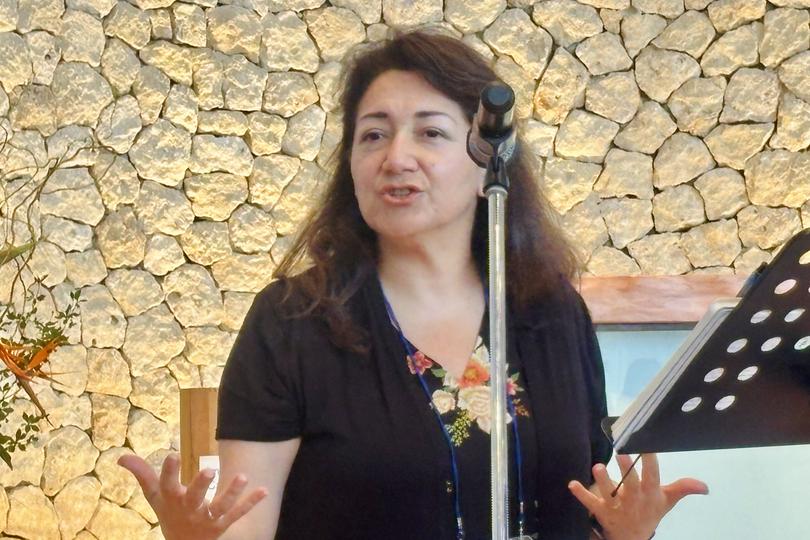Editor's note: Dr. Nina Balmaceda, the Irene and William McCutchen Associate Professor of the Practice of Reconciliation and Director of the Center for Reconciliation at Duke University's Divinity School, attended the recent 12th Christian Forum for Reconciliation in Northeast Asia (NARI) in Okinawa, Japan and is a regular participant of the forum. Originally from Peru, Dr. Balmaceda shares in an exclusive interview with China Christian Daily about the mission of the center, her reflections on reconciliation in diverse contexts, and her hopes for dialogue between China, the United States, and the global church.
China Christian Daily: Can you introduce the Duke Divinity School and the Center for Reconciliation?
Nina Balmaceda: Founded in 1926, Duke Divinity School is an ecumenical school of Methodist roots. We are blessed by having faculty from different Christian traditions, including Methodist, Anglican, Episcopal, Presbyterian, Baptist, Catholic, and Anabaptist, among others. We try to cultivate a community of scholars, students, and staff members. Our School of Divinity offers great opportunities to students to grow in their spiritual formation, do scholarly research, and become well-equipped to serve as pastors, non-governmental organization leaders, or public servants, according to each person's vocation.
The Center for Reconciliation has the mission of fostering theology for reconciliation and best practices for conflict transformation. We stand for healthier ways to deal with conflict, fostering understanding and healing—not violence and harm. We accompany seasoned and emerging leaders who want to embrace the message of reconciliation in their discourse and behavior, inviting others to participate in restorative practices, motivating dialogue, to listen to one another, not to impose their views on others by force.
In 2005, the center's co-founders, Dr. Chris Rice and Dr. Immanuel Katongole, had a vision of establishing an academic center to foster opportunities for Christians of all different traditions in an ecumenical way to learn together about reconciliation. Since then, there has been a lot of harm committed in this world, even from Christians against other Christians. It is clear that we need to develop a better understanding of reconciliation, acknowledging responsibility and recognizing the importance of genuine apology, accountability, reparations, and forgiveness when harm has been committed.
China Christian Daily: What are your takeaways from this year's forum?
Nina Balmaceda: The most important takeaway for me is the importance of listening. In order for us to understand other people, we have to take time to listen deeply. It does not mean necessarily that we are going to agree with the other person, but if we are willing to listen to them, we might be able to empathize with them and find it easier to forgive or ask for their forgiveness. But to get there, we need to listen to one another first.
China Christian Daily: What things are going to be reconciled in the United States?
Nina Balmaceda: In the United States, as in most if not all countries in the world, there are histories of oppression that need healing. For example, in the United States, African American people have suffered exclusion; indigenous people have suffered displacement from their lands and also discrimination. Our message to the people of the United States and any other nation is an invitation to dialogue, to be courageous, and offer respect to those who think differently from us.
China Christian Daily: For American Christians, what should they do to promote the ministry of reconciliation, especially in the bad relationship between China and the United States?
Nina Balmaceda: I'm a strong believer in diplomacy. I think we must invest energy in fostering respectful relationships and collaboration. Our respective governments should decide that violence is never the way and that diplomatic negotiation should always be the way forward. It is important that the general population in our countries can foster friendships, dialogue, and encounters so that we can understand each other better. Because our countries are different, we speak different languages and have very different cultures, getting to know each other is very relevant. We also must acknowledge that at the basic level, we all are human beings, we all want to protect our families and communities. Violence harms people and generates cycles of hostility between people groups. My great desire is that for China and the United States, there will always be space for diplomatic dialogue at the government level, and various opportunities for dialogue and learning between the people of both countries.
China Christian Daily: What do you think the ministry of reconciliation applies to colonized countries?
Nina Balmaceda: The ministry of reconciliation invites us to have a hard look at ourselves and be self-critical. It is very important to recognize that all people, not only Christians, have fundamental rights. The history of too many places in the world shows abuse and oppression.Vulnerable populations have been marginalized, exploited, and deprived of their lands and their resources. If we are going to talk about reconciliation, especially in the name of the Lord Jesus of Nazareth, it is extremely important to pay attention to the voices of marginalized populations. For example, indigenous groups in Latin America are at risk of extinction. Their languages and cultures are disappearing. We must protect vulnerable populations in all countries in the world and establish appropriate public policies to support their well-being in noncolonial ways. In this effort, it is relevant to remember that their language, culture, and epistemology must be respected as much as possible. We do not have to make them look like us. It is better to collaborate with them so they can have the tools and resources to pursue their own transformation into healthier communities, protecting their language and cultural heritage.
China Christian Daily: Then what about women?
Nina Balmaceda: Women have achieved much in the last century in many parts of the world. I was recently giving a lecture in Connecticut, reminding the audience that before 1920, women could not vote in the United States. Only 105 years have passed since women were allowed to exercise their most fundamental political right. We must recognize how far we have come, that many women can have opportunities for higher education almost at the same levels than men in many countries of the world. In the United States in particular, more women go to college than men. But it is not enough. In a number of countries, the condition of women needs to improve. When women can receive an education and pursue a career, it is not only better for women, but for that whole society. In the case of many mothers, they are the most important teachers for their children. As conditions improve for them, they will be able to better educate themselves and that will be a great blessing for their own children, their extended family and their community. Social science shows that better public policy for women is better policy for the whole society.
We should also think of the conditions needed by people with disabilities to flourish in society. We need good public policies to support individuals with disabilities, and their families and caregivers. It is extremely important that we pay attention to the rights and the specific needs of people with disabilities. How well we treat them will say much about the quality of our society.
China Christian Daily: What about women in the church?
Nina Balmaceda: In my Anabaptist church, my pastor is a woman. We have the blessing of worshipping the Lord in a very egalitarian space. I often have the privilege of preaching in churches, but I recognize that different traditions have different rules, and each tradition needs to have its own process. It should not be people from other places to tell them what to do, but it should be an internal process for them in their own congregation or denomination. I think that, as congregations give more opportunities for women's voices to be heard, those congregations will become healthier communities.
China Christian Daily: Have you ever been to China?
Nina Balmaceda: Yes, three times. I was fascinated by the traditional and modern architecture. Every time I was in China for a conference, I was pleased with the scholarly excellence of the colleagues I met. I hope that there will be an opportunity to visit China again in the near future.
China Christian Daily: Do you have any words for the church in China?
Nina Balmaceda: I believe that the church in China is probably the biggest church in the world. I have admiration, love, and appreciation for the ministry of every sibling in Christ who is in China. My blessing to each of you in the name of our Lord is that you will continue not only speaking the message of Christ but living it out every day. If our actions fail to reflect our beliefs, our words will drift away like leaves in the wind, as the Spanish saying goes. The testimony of how we live, such as loving our neighbor, is what stays.












